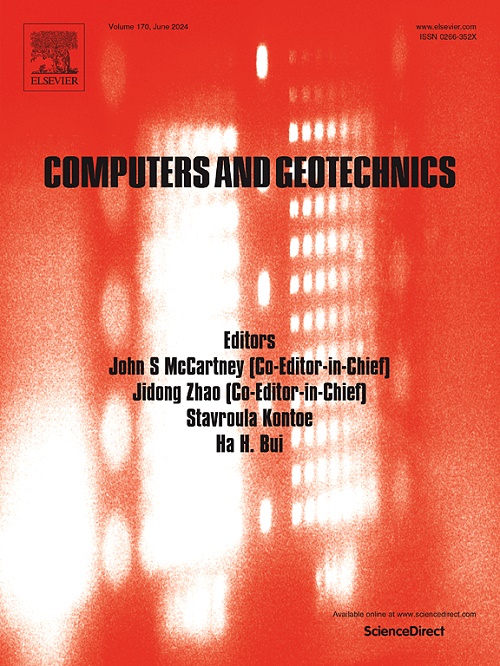Infiltration characteristics of slurries in porous media based on the coupled Lattice-Boltzmann discrete element method
IF 5.3
1区 工程技术
Q1 COMPUTER SCIENCE, INTERDISCIPLINARY APPLICATIONS
引用次数: 0
Abstract
Slurry infiltration clogging commonly occurs in porous media with fine pores. This infiltration leads to changes in the mechanical properties of the matrix, causing challenges such as material drainage difficulties and uneven force distributions. To investigate the clogging behavior of slurries under various pressure conditions, this study employs a simulation approach with corresponding theoretical analyses. Specifically, it utilizes the discrete element method (DEM) in conjunction with the lattice-Boltzmann method (LBM) to simulate the microscopic infiltration test of slurries in porous media. The findings reveal that fine soil particles exhibit greater mobility compared to their larger counterparts. Furthermore, statistical analysis demonstrates that the degree of pore-clogging is not always positively correlated with pressure. Higher pressures can also lead to the unclogging of the pore space. These observations indicate that particle sizes and pressure conditions are key factors influencing the potential for particle clogging. Based on the analysis, a clogging mechanism is proposed to elucidate the dynamics of particles in porous media. This study provides insights into clogging formation within porous media, leading to a better understanding of both slurry filtration in geotechnical engineering and hyporheic exchange phenomena in stream bed ecosystems.
基于格点-玻尔兹曼离散元耦合法的多孔介质中泥浆的渗透特性
泥浆渗透堵塞通常发生在具有细孔的多孔介质中。这种渗透会导致基体的机械性能发生变化,从而带来材料排水困难和力分布不均等难题。为了研究泥浆在各种压力条件下的堵塞行为,本研究采用了一种具有相应理论分析的模拟方法。具体地说,它利用离散元法(DEM)结合晶格-玻尔兹曼法(LBM)来模拟泥浆在多孔介质中的微观渗透试验。研究结果表明,与较大的土壤颗粒相比,细小的土壤颗粒具有更大的流动性。此外,统计分析表明,孔隙堵塞程度并不总是与压力成正相关。较高的压力也会导致孔隙疏通。这些观察结果表明,颗粒大小和压力条件是影响颗粒堵塞可能性的关键因素。根据分析结果,提出了一种堵塞机制,以阐明多孔介质中颗粒的动态变化。这项研究提供了关于多孔介质中堵塞形成的见解,有助于更好地理解岩土工程中的泥浆过滤和河床生态系统中的水力交换现象。
本文章由计算机程序翻译,如有差异,请以英文原文为准。
求助全文
约1分钟内获得全文
求助全文
来源期刊

Computers and Geotechnics
地学-地球科学综合
CiteScore
9.10
自引率
15.10%
发文量
438
审稿时长
45 days
期刊介绍:
The use of computers is firmly established in geotechnical engineering and continues to grow rapidly in both engineering practice and academe. The development of advanced numerical techniques and constitutive modeling, in conjunction with rapid developments in computer hardware, enables problems to be tackled that were unthinkable even a few years ago. Computers and Geotechnics provides an up-to-date reference for engineers and researchers engaged in computer aided analysis and research in geotechnical engineering. The journal is intended for an expeditious dissemination of advanced computer applications across a broad range of geotechnical topics. Contributions on advances in numerical algorithms, computer implementation of new constitutive models and probabilistic methods are especially encouraged.
 求助内容:
求助内容: 应助结果提醒方式:
应助结果提醒方式:


